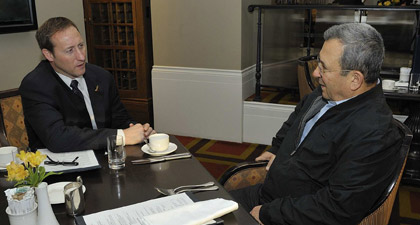HALIFAX — Israeli Defence Minister Ehud Barak called the recent Arab Spring “almost inspiring and moving” during a wide-ranging public interview at the Halifax International Security Forum last weekend in the Nova Scotia capital.
“Of course, we can’t predict what will happen in the short- and mid-term,” he said.
“There is always a risk of some societies being taken over by Muslim Brotherhoods who are determined to come to power. You can’t choose your parents. We can’t choose our neighbours. They are who they are. In Israel, we certainly enjoy a high quality of life, but we don’t pretend to control the area.”
Barak was one of more than 300 leaders from 41 countries attending the third such conference held in Halifax in the last three years. A downtown hotel was closed to the public, and security was extremely high.
A cadre of security guards surrounded Barak as he entered and exited the 500-seat meeting hall.
The 30-minute interview, conducted by Robin Shepherd, director of international affairs at the British-based think-tank Henry Jackson Society, covered defence issues facing Israel, its concerns about Iran, the internal struggles in Syria and the Palestinian situation. There was no open questioning from participants or the media.
Barak stressed Israel’s defence strategies haven’t changed with the overthrow of the regimes in Egypt, Libya and potentially Syria. He said flexibility has been the theme of Israel’s strategy, using knowledge gained from previous experiences and challenges.
“We know where we have to fight. It’s not in Antarctica or Afghanistan. It’s at home. And we face the same challenges as previously stated by [Canadian Minister of National Defence] Peter MacKay and [U.S. Defence Secretary] Leon Panetta. We have similar budgetary constraints and have to become more cost effective strategically.”
He said Israel couldn’t control what happens tomorrow in Syria or Yemen or the Palestinian Authority or with Hamas, or in any other Middle Eastern country.
“We have to try collectively to reduce tensions wherever we can, to keep peace with Egypt and Jordan as far as we can, and focus on the main issues. But we know the Arabs have more profound issues among themselves.”
Regarding Syria and the struggles of the people to unseat President Bashar Assad, Barak said that the Syrian leader “went beyond the point of no return. He can’t be legitimate with his people any longer. The slope has become steeper, and even people within his service are looking at the end [of his regime].”
The Israeli defence minister pointed out Assad’s memory “will be refreshed by what happened to [Libyan leader Moammar] Gadhafi, yet that might drive him to be more brutal.”
However, he said, the Arab League has responded negatively to Assad’s leadership, a signal that there is acceleration toward the end of his rule.
“[When Assad leaves], it will be good for the Syrian people and the Arab world,” Barak added. “It will damage the radical axis, will weaken Hezbollah and Hamas, and that will be good for Israel and the Middle East as a whole.”
When Shepherd asked whether Israel’s attitude toward Iran leans toward military attack or containment, Barak noticeably raised his eyebrows.
“Iran is a challenge to the whole world, not just Israel,” he said, a statement echoed by other leaders such as MacKay, who stressed Canada’s support for Israel and Canada’s censure of nuclear buildup in Iran.
“It’s a major threat,” said Barak. “We’re in a competition between Iran reaching nuclear military capability and the rest of the world getting there. In Israel, we think a nuclear Iran is unacceptable. We’re determined to prevent them from being nuclear, and all options must be removed from the table.
“I hope we’ll see sanctions imposed effectively, with no choice given to Iranian leadership. Previous and current presidents of the United States, Mr. [George W.] Bush and [Barack] Obama, and leaders in Britain and France, have also said it’s unacceptable. We prefer diplomacy and sanctions, but no option should be removed from the table.”
He concluded with a half-smile to Shepherd: “However, we won’t reach the point of military action without having another interview with you.”
In a news conference with Barak in Ottawa before the Halifax forum, MacKay said that “Canada and Israel have enjoyed close bilateral defence relations for some time and our special relationship with Israel has grown stronger in recent years. Canada and Israel have shared values in key areas, such as public security, trade and investment, democracy and the rule of law, and our growing relations in the defence sector enables a more prosperous relationship in the future.”
MacKay and Barak discussed key issues, including the significance of benefits from the exchange of best practices between their respective defence ministries as well as changing regional dynamics in the Middle East, including Iran.
As a strong ally of Israel, MacKay said Canada is concerned about the alarming and threatening overtures that Iran has directed toward Israel.
While in Ottawa last week, Barak also met with Foreign Minister John Baird. The two discussed the “strong and multifaceted ties” between the two countries, Joseph Lavoie, a spokesperson for Baird, told The CJN. This bond is “further enhanced by ministerial visits and dialogues such as this one,” he said.
During their meeting, the ministers discussed the Arab uprisings, recent developments in the Middle East peace process, regional security, and the recent International Atomic Energy Agency report on Iran’s nuclear program, Lavoie said.
With files from Andy Levy-Ajzenkopf
